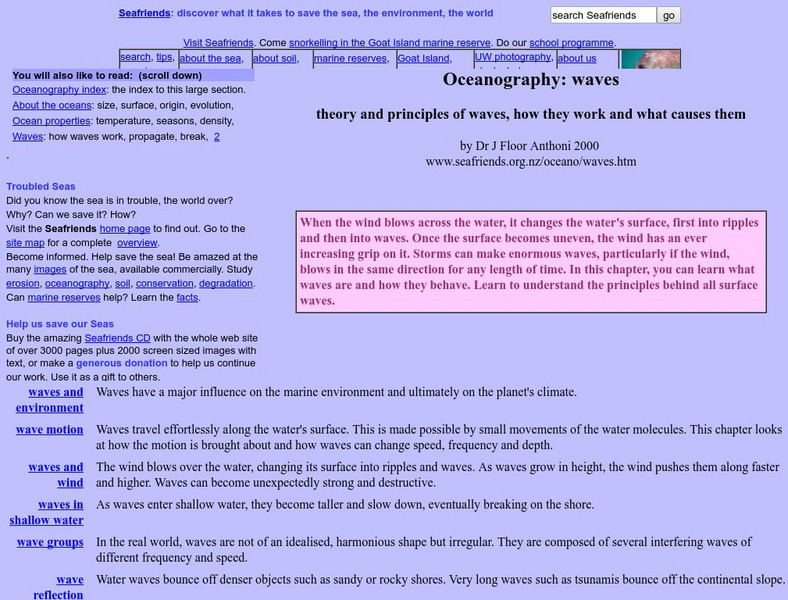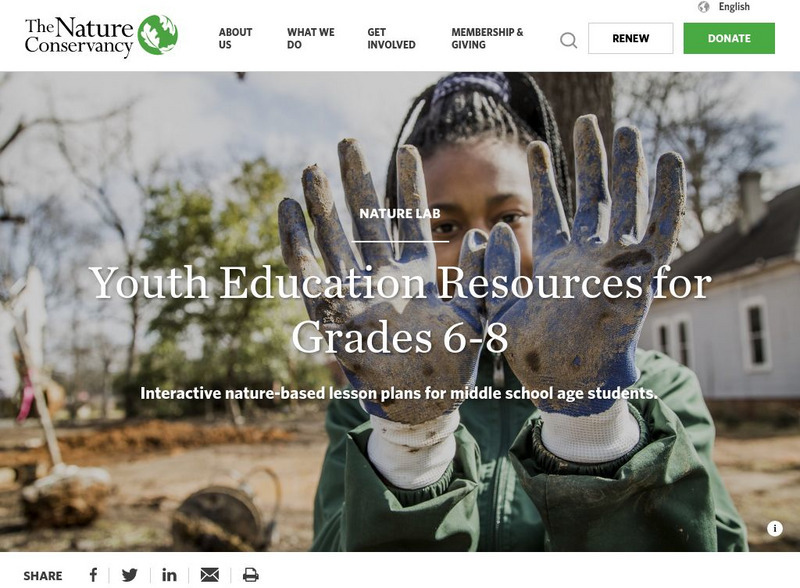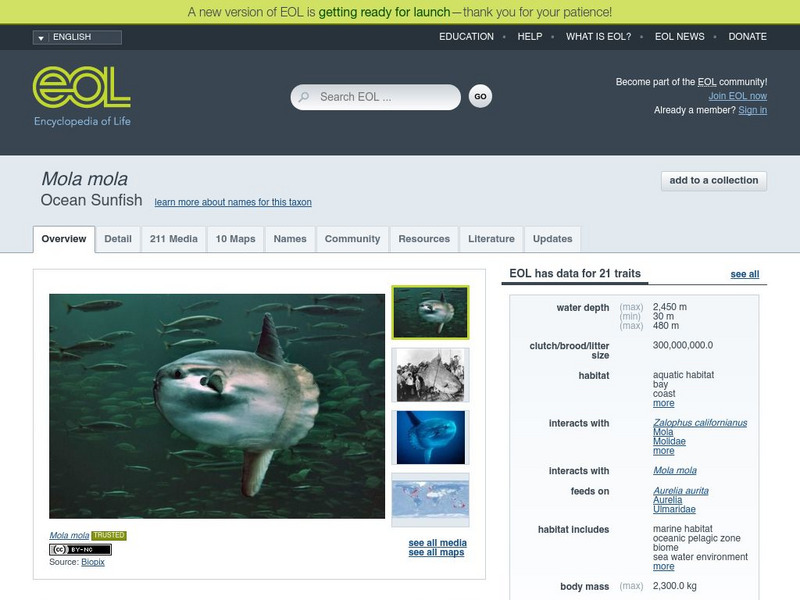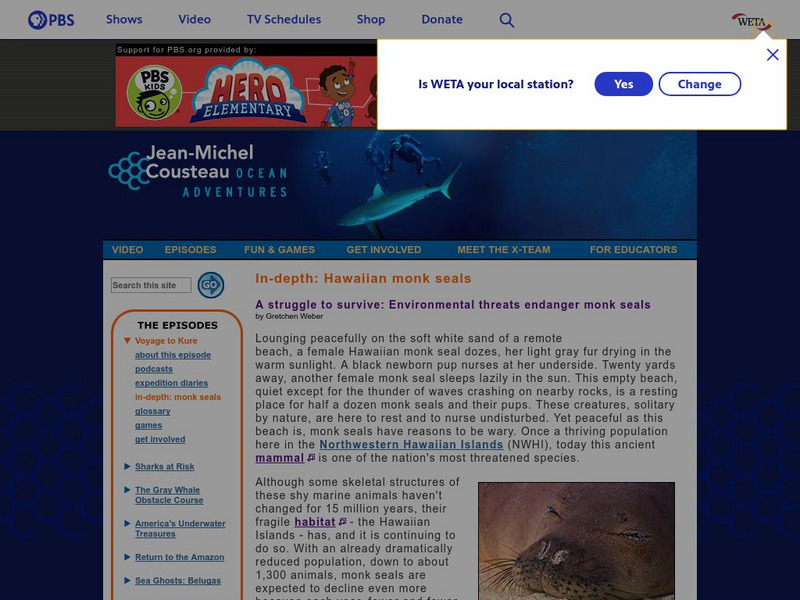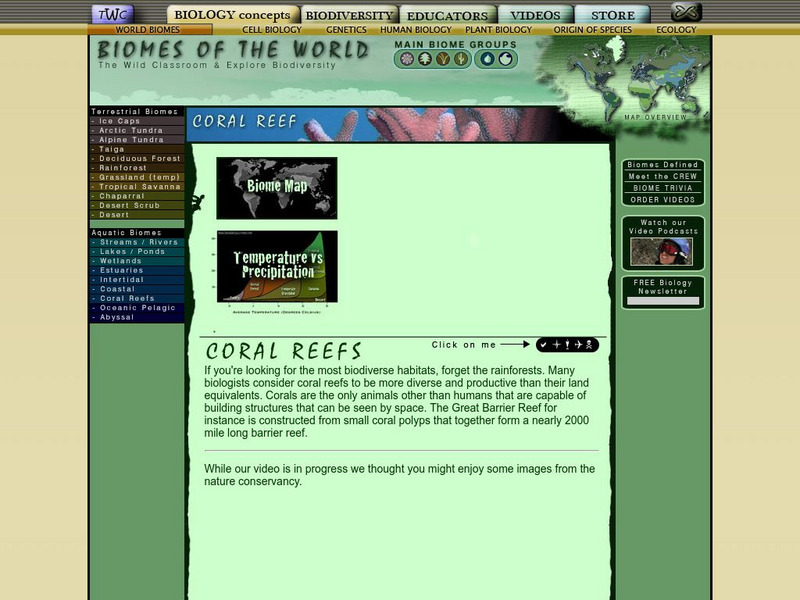Hi, what do you want to do?
Other
Seafriends Marine Conservation and Education Centre: Oceanography: Waves
A very detailed article on the characteristics of waves and wave behavior. It discusses the influence waves have on the marine environment and the global climate, the physics of wave motion, the interactions between waves and wind, wave...
PBS
Pbs: Jean Michael Cousteau Ocean Adventures: Predator Protector
This is a great interactive game that allows players to guide three different threatened shark species to food and away from danger.
MarineBio Conservation Society
Marine Bio: Ocean Sunfishes
Illustrated reference guide features useful information on ocean sunfishes with facts on physical characteristics, behavior, range, habitat, diet, and conservation status.
Texas Instruments
Texas Instruments: Jason: Pinniped Body Shape Conserving Warmth
From Shore to Sea: To survive in cold ocean environments an organism's body must be adapted to life under water. A body will cool very quickly when in contact with water. The body shape of an organism is one adaptation that helps to...
Nature Conservancy
Nature Conservancy: Planet Earth: Oceans and Coasts
Compilation of the Nature Conservancy's content about the ecology of oceans and coasts. Emphasis is on the biodiversity of these habitats and the human impact on the animal and plant life that live in our oceans and on our coasts.
Other
Sea Turtle Conservancy: Information About Sea Turtles: Loggerhead Sea Turtle
An organized snapshot of the endangered Loggerhead Sea Turtle. Find out some biological information as well as the conservation status about this marine reptile.
Nature Conservancy
The Nature Conservancy: Coral Reefs of Palau: Nature's Amazing Underwater Cities
This lesson takes students on a virtual field trip to the coral reefs of Palau where they will explore amazing underwater cities found near a remote network of islands in the Pacific Ocean. Learn all about an ecosystem of symbiosis....
NOAA
Noaa: National Ocean Service Education: Nonpoint Source Pollution
Illustrated tutorial explains nonpoint source pollution and its role in the health of the environment. Students learn about different sources of pollution and how these pollutants contaminate the land, air, and water. Click on the links...
Nature Conservancy
The Nature Conservancy: The Importance of Biological Interactions
Organisms have a variety of relationships. In this instructional activity, students learn to categorize relationships according to their impact on organisms and the terminology for these biological interactions.
Encyclopedia of Life
Encyclopedia of Life: Ocean Sunfish
The Encyclopedia of Life presents this in-depth overview of Ocean Sunfish (Mola mola), including their habitats, size, conservation status, and much more. Images of this species and maps of its global distribution can also be found here.
Science Education Resource Center at Carleton College
Serc: Earthlabs: Corals Unit Overview
Six lab investigations on corals expose learners to some of the most current scientific research, data, and visualizations in a way that allows them to become active participants in both learning about and conserving coral reefs.
PBS
Pbs: Ocean Adventures: Hawaiian Monk Seals
Site uncovers the environmental threats that endanger monk seals.
Nature Conservancy
Nature Conservancy: California, Protecting the Golden State
Explore the rich habitats and natural beauty of the California landscape in this interactive video.
Nature Conservancy
Nature Conservancy: California
Explore the rich habitats and natural beauty of the California landscape in this interactive video.
The Wild Classroom
The Wild Classroom: Biomes of the World: The Deep Sea Biome
Learn all about the abyssal ocean ecosystem. Find out about plants, animals, adaptations, and conservation efforts.
The Wild Classroom
The Wild Classroom: Biomes of the World: Intertidal Zone
Learn about the intertidal ecosystem. Find out about plants, animals, adaptations, and conservation efforts.
Canadian Wildlife Federation
Hinterland Who's Who: Seabirds
Get the facts about seabirds. This group of birds makes up about three percent of the various species, even though two-thirds of the Earth is covered in water. Learn some unique facts and characteristics of seabirds. Also included in...
Other
World Wildlife Federation: Sea Turtle: Loggerhead Turtle
This nicely illustrated description of the endangered Loggerhead Sea Turtle provides conservation information about this marine reptile.
University of Florida
Florida Museum of Natural History: Shark Basics
You will find the most commonly asked shark questions in this comprehensive site. Topics include shark basics, shark biology, shark conservation, shark attacks, and shark research.
Globio
Glossopedia: Environments
This article defines "environment" as a collection of animals and plants in a specific landscape and climate. The concept of differing types of environments is introduced. The impact of humans on environments and all environments'...
World Wildlife Fund for Nature
World Wildlife Federation: Loggerhead Turtle
Read biological facts and conservation information about the endangered Loggerhead Sea Turtle. Find out about the main threats to the turtles and what is being down to help.
The Wild Classroom
The Wild Classroom: Biomes of the World: Coral Reef Biome
Learn about the coral reef ecosystem. Find out about plants, animals, adaptations, and conservation efforts.
NOAA
Noaa: Ocean Explorer: Keeping Watch on Coral Reefs
Learners read coral reef tutorials, describe the role of satellites, analyze oceanographic data, and identify actions to reduce threats to these fragile ecosystems. Their goal is to ultimately produce a public education program about...
Other
Project Wet: Discover Water
Interactive opportunities which emphasize the impact water has on our lives. Explore watersheds, ocean water, fresh water sources, and ways to use water responsibly by engaging in activities, coloring pages, and short quizzes.





